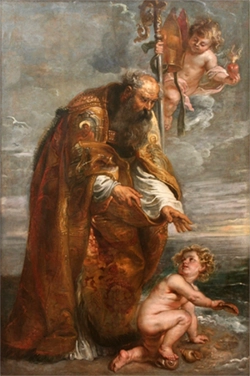St. Augustine (born November 13, 354, Tagaste, Numidia—died August 28, 430, Hippo Regius, was the bishop of Hippo from 396 to 430, one of the Latin Fathers of the Church and perhaps the most significant Christian thinker after St. Paul. Augustine’s adaptation of classical thought to Christian teaching created a theological system of great power and lasting influence. His numerous written works shaped the practice of biblical exegesis and helped lay the foundation for much of medieval and modern Christian thought.
Augustine is remarkable for what he did and extraordinary for what he wrote. If none of his written works had survived, he would still have been a figure to be reckoned with, but his stature would have been more nearly that of some of his contemporaries. However, more than five million words of his writings survive, virtually all displaying the strength and sharpness of his mind and some possessing the rare power to attract and hold the attention of readers in both his day and ours. His distinctive theological style shaped Latin Christianity in a way surpassed only by Scripture itself. His work continues to hold contemporary relevance.
Intellectually, Augustine represents the most influential adaptation of the ancient Platonic tradition with Christian ideas that ever occurred in the Latin Christian world. His writings were so widely read and imitated throughout Latin Christendom that his particular synthesis of Christian, Roman, and Platonic traditions defined the terms for much later tradition and debate. Both modern Roman Catholic and Protestant Christianity owe much to Augustine, though in some ways each community has at times been embarrassed to own up to that allegiance in the face of irreconcilable elements in his thought. An important example is that Augustine was both a champion of human freedom and an articulate defender of divine predestination, and his views on sexuality were humane in intent but have often been received as oppressive.
Two of Augustine’s works stand out above the others for their lasting influence, but they have had very different fates. The City of God was widely read in Augustine’s time and throughout the Middle Ages and still demands attention today, but it is impossible to read without a determined effort to place it in its historical context. Confessions was not much read in the first centuries of the Middle Ages, but from the 12th century onward it has been continuously read as a vivid portrayal of an individual’s struggle for self-definition in the presence of a powerful God.
The most widespread and longest-lasting theological controversies of the 4th century focused on the Christian doctrine of the Trinity—that is, the threeness of God represented in the Father, Son, and Holy Spirit. Augustine’s Africa had been left out of much of the fray, as what was written on the subject was in Greek, a language Augustine barely knew. But he was keenly aware of the prestige and importance of the topic, and so in 15 books he wrote his own exposition of it, De trinitate (399/400–416/421; On The Trinity). While he was carefully orthodox, Augustine added his own emphasis in the way he taught the resemblance between God and man. He thought the threeness of God was reflected in a large number of similar triples in the human soul.
Shortly before Augustine's death, the Vandals, a Germanic tribe that had converted to Arianism, invaded Roman Africa. The Vandals besieged Hippo in the spring of 430 when Augustine entered his final illness. Augustine has been said to have excommunicated himself upon the approach of his death in an act of public penance and solidarity with sinners. Spending his final days in prayer and repentance, he requested the penitential Psalms of David be hung on his walls so he could read them, leading him to "weep freely and constantly" according to Posiddius' biography. He directed the library of the church in Hippo and all the books therein should be carefully preserved. He died on 28 August 430, and shortly after his death, the Vandals lifted the siege of Hippo. When they later returned and burned the city, they destroyed all but Augustine's cathedral and library, which they left untouched.

